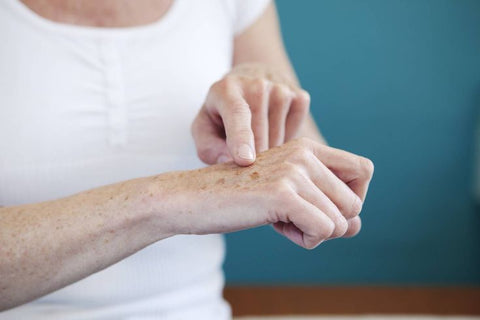The arrival of menopause involves many changes, both physical and psychological, which can cause irritability, anxiety, depression, self-esteem problems... If you are in menopause or close to it, do not hesitate to take care of your mind as well as your body.
Menopause from a social point of view
It happens to all of us sooner or later, the arrival of menopause means a change in our lives and in the way we perceive our bodies. It is another stage of human development and, for us as women, it means a transition: from having reproductive capacity to not having it. The inevitable gender conditioning, together with the number of physical and psychological changes that appear, means that menopause is sometimes experienced with fear and rejection . It is often a difficult process to assimilate, since it can have a negative connotation associated with aging, loss of beauty, youth and sexual attractiveness. All of this can make women vulnerable to a decrease in self-esteem and a feeling of loss of social value. Added to the physical changes typical of age, they can generate a physical and mental overload that affects a woman's health.

Along the same lines, WHO (2022) regrets that, in most countries, awareness of menopause and access to information and services related to it continue to present significant deficiencies. Consequently, the topic of menopause is often silenced not only in health centres, but also in families, communities and workplaces.
This can lead to many women being unaware of the symptoms they are experiencing and their relationship to menopause, or avoiding seeking help due to discomfort or embarrassment in sharing their experience with others.
What changes occur on an emotional and psychological level?
In this new stage of life you may feel sad, irritable or anxious, and you may need support and understanding from your loved ones or your partner. The changes that occur, both before (perimenopause) and after menopause (postmenopause) can affect you psychologically. It is important to keep in mind that much of the discomfort that occurs at this stage, although not all, is of psychological origin and, although in most cases this does not pose a problem, it can affect your quality of life and have an impact on your relationships. Some of the changes that can occur on a mental and emotional level:

1. Irritability. Irritability is one of the most common mood problems during menopause, and is present in up to 70% of women. Part of this irritability may appear accompanied by depressive symptoms and is usually manifested through constant tension, high levels of sensitivity, low tolerance to frustration, body dysphoria, vulnerability, among others.
2. Sleep problems. Difficulty falling asleep (insomnia), staying asleep or waking up at night can be very common. It is usually the result of several factors and has a great impact on a woman's quality of life. It has been seen that sleep problems occur an average of 3.5 times more often after menopause than before it . Obviously, this symptomatology of sleep pattern alteration can cause or aggravate the irritability that we have previously discussed.
3. Self-esteem problems. Self-esteem is important for our perception of ourselves and the outside world. Menopause can significantly affect this perception and cause a perceived decrease in our self-worth , which can lead to a deterioration in our image and affect our way of seeing life. An unstable relationship with our partner, the fear that he or she will look for younger or more attractive partners, can cause insecurities and an imbalance in psychological well-being , which in turn leads to depressive symptoms, sadness or irritability.
4. Depression . Depressive symptoms are common both during menopause and during menopause itself. Couto Núñez et al. in their 2014 study established that approximately 10% of women experience some type of depressive disorder during menopause , which leads to feelings of listlessness, emotional instability, decreased libido and nervousness. During this period of life, the risk of suffering from more serious psychological disorders such as major depression has been seen to increase.
5. Anxiety. Like depression, anxiety disorders are also common during menopause. Worry , fear, tension or behavioural activation, typical of anxiety as an emotional state, are a normal and adaptive response to the anticipation of harm or stressful situations.

However, when these symptoms occur with excessive intensity, over a prolonged period of time or in an irrational manner, they can cause a lot of discomfort and lead to a deterioration in the quality of life of the woman and her environment. It is also important to remember that, as Carvajal-Lohr et al. mention in their 2016 psychology study , the prevalence of anxiety disorders in women is twice that in men.
How to take care of our mental health
It is a fact that menopause is a period full of changes and new challenges, but there are also many indications and tips, some of them preventive, to make the transition through this stage as smooth and pleasant as possible.
Change your attitude . It is important to learn to generate a positive attitude towards your body and create realistic expectations of what is happening, or will happen. Aging is part of the cycle of life and there is no need to be ashamed of it. All stages of life have their own crises and menopause could not be the exception. It is important to remember that menopause is not a disease , but another stage in a woman's life. Do not hesitate to go to mental health professionals to help you take the step in this process of acceptance if you consider it necessary. It is not worth suffering when you can manage it better.
Hormone replacement therapy (HRT). Since hormonal deficiencies, such as estrogen, are normal and common during menopause, it is important to discuss this option with your doctor as well.
The effectiveness of this therapy focuses on the improvement of physical symptoms such as vaginal dryness or dyspareunia and can also contribute to an improvement in general mood.

However, it is important to remember that HRT will improve all those symptoms that depend directly on the hormone deficiency, but not all psychological symptoms, so a combination of medical treatment and appropriate psychotherapeutic support will be necessary. In our country, only 5% of menopausal women opt for hormone replacement therapy due to fear of the side effects it may have.
Preventing insomnia . Poor sleep has been shown to be a contributing factor to menopausal symptoms, so it is important to maintain a good sleep routine that includes going to bed when you are sleepy, removing screens and cell phones from your sleeping area and turning them off 2 hours before going to sleep, getting up if you can't fall asleep to do a relaxing activity, always waking up at the same time, and trying not to take naps during the day.
Activities aimed at improving sexual health . In addition to all the products you may have at your disposal to help you with vaginal dryness, libido problems or to reach climax, among others, it is important that in addition to taking care of your physical health, you take care, as much or more, of your mental health. Talk to your partner about your current needs. Non-coital displays of affection are also important, as they help maintain the bond with your partner. There are many options for sexual practices to improve your sex life as a couple, do not forget that it is never too late to experiment with new things, if you feel like it.





Comments (0)
There are no comments for this article. Be the first one to leave a message!